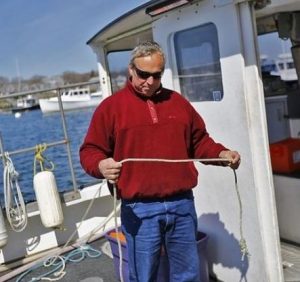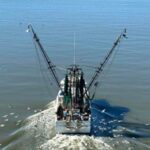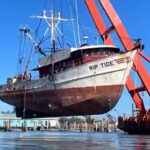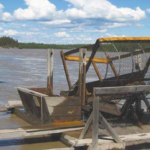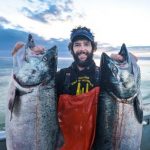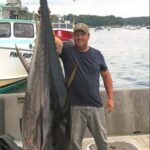Monthly Archives: April 2018
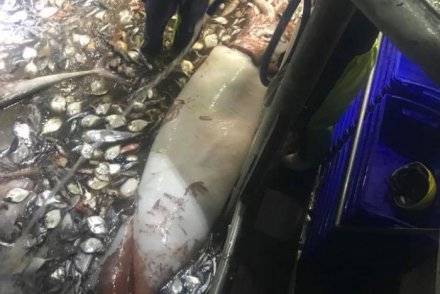
Giant squid potentially worth a fortune tossed overboard
A fishing crew off the west coast of Tasmania potentially throws away a fortune after tossing a giant squid close to three metres long back into the sea. As far as bycatch goes, this one was a whopper — a giant squid hauled in by the crew of the Empress Pearl off the west coast of Tasmania. The South East Trawl Fishing Association reported the squid was estimated to be close to three metres long and weighed up to 100 kilograms. According to the association, not only was the squid enormous, it was also potentially worth a lot of money. >click to read<11:00
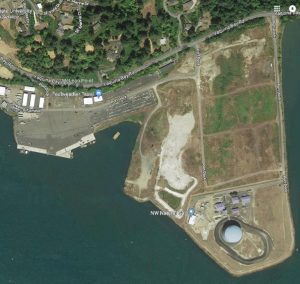
Newport Port Commission Chairwoman resigns – fishermen dare commission to raise moorage/equipment rates
There was no explanation or any details about Patricia Patrick-Joling’s resignation or in Commissioner Jeff Lackey’s self-removal as Commission Vice-President. Ms. Patrick-Joling was not immediately available for comment. However, News Lincoln County can report that this week’s port commission meeting saw a large crowd of commercial and private fishermen lambasting the commission for what they described as an ineffective agency and daring the commission to raise moorage rates and rates for use of heavy equipment to load and offload fishing vessels. Comments were often made as to the central, if not pivotal role, that commercial fishing contributes to the port’s income and that if rates are raised to the extent recommended by port staff, they will pick up and move.>click to read<09:39
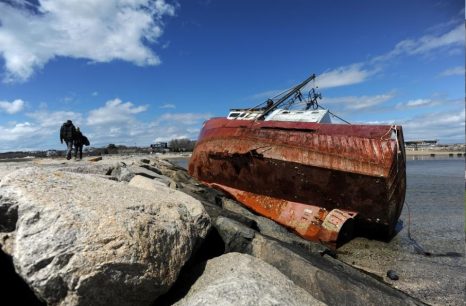
Provincetown targets “attractive nuisance”
The breakwater has had an added attraction latley that may require legal action; the Artemis, a 42-long defunct fishing vessel, has been grounded agaist the breakwater since early March. The ship broke its mooring in a storm and doesn’t seem to be leaving anytime soon. Another boat, the My Yot also broke its mooring, and is stranded nearby.,, the town is looking at legal options to get Artemis removed.>click to read<09:14

Lawsuit challenges fishing methods that could threaten right whales
An environmental activist is seeking a preliminary injunction to stop the use of vertical buoy fishing lines in Massachusetts waters to protect critically endangered North Atlantic right whales. In lawsuit filed in late February in U.S. District Court in Boston, conservationist Richard Maximus Strahan of Peterborough, New Hampshire, has sued the administrator of the National Oceanic and Atmospheric Administration, the assistant administrator of the Nation Marine Fisheries Service, the secretary of the Massachusetts Office of Energy and Environmental Affairs, the director of the state Division of Massachusetts Fisheries Service, the commissioners of the Atlantic States Marine Fisheries Commission and the Massachusetts Lobstermen’s Association, as a representative of its members. Strahan wants to stop the state’s lobster association members from further lobster pot and gill net commercial fishing operations unless they can scientifically demonstrate the endangered whales and sea turtles would not be killed or injured. >click to read<19:14
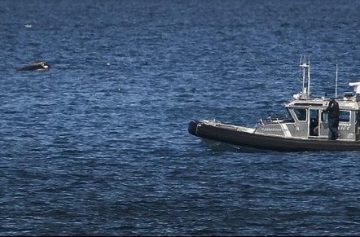
State regulators: Lobster season will have to wait – a sudden influx of right whales
Lobstermen already have to observe a three month closure from Feb. 1 to April 30 annually in an effort to reduce the number of whales that get entangled in fishing gear during their annual migration. Now, however, boats won’t be able to hit the water until May 6 at the earliest, and a second regulation imposes a 10 knot speed limit for vessels less than 65 feet long through May 15. Right whales feed close to the surface and are vulnerable to vessel strikes. “There are a number of challenges in this industry, and one of those is being able to fund your livelihood for 12 months when you can only fish for nine months,” John Haviland, president of the South Shore Lobster Fishermen’s Association, said. >click to read<17:34

FISH-NL calls on Labour Board to conduct vote – FFAW-Unifor’s membership numbers ‘misleading’
Almost 16 months after FISH-NL presented an application for certification, the preliminary report of an investigator with the Labour Relations Board was released last week, with final submissions on Wednesday. The investigator’s report is now in the hands of the Board, which will ultimately decide how to proceed. FISH-NL has estimated the number of inshore harvesters in the province at around 4,500, while the FFAW-Unifor pegs the number at as high as 10,000. The difference is in definition. >click to read<15:50
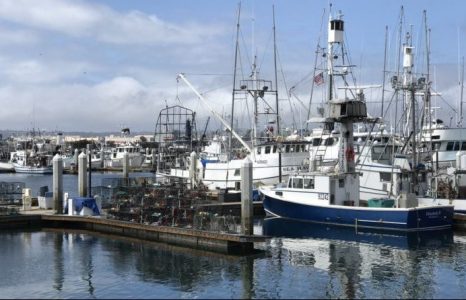
San Diego’s “Fishy” History: The Birth of Tuna Fisheries
Founding of the American Tuna Fishery – San Diego is often credited with birthing the American tuna fishery. The industry traces back to 1903, when a sardine packer in San Pedro switched to canning of albacore. “Consumers’ acceptance of canned tuna soon led to the development of fishing fleets in both San Diego and San Pedro,” a research paper published by the National Marine Fisheries Service (NMFS) in July 1978 stated. “San Diego became the major base for the fleet, a position it continues to hold [through 1978].” The first cannery opened its doors in 1909; the first tuna cannery arrived two years later. >click to read<13:31
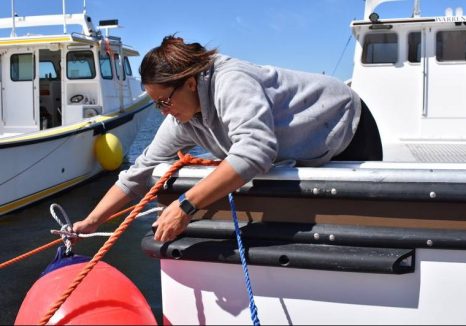
Fishermen prepare for lobster season
Warren Francis and his family were in high spirits as they readied their brand-new fishing boat at Pictou Landing’s wharf under a sunny spring sky for the upcoming lobster season starting next Monday.,, But fisherman Ronnie Heighton, who sits on the Gulf of Nova Scotia Fleet Planning Board, said that fishermen plying the Northumberland Strait for catches can “live quite happily.” “There’s never a bad day when you fish lobster,”,, However, Heighton states that danger lies ahead for fishermen who rely on the Strait for their livelihoods.>click to read<12:00

Coast Guard medevacs 66-year-old man from fishing boat 40 miles southwest of Fort Myers Beach
The Coast Guard medevaced a 66-year-old man from a 90-foot fishing boat 40 miles southwest of Fort Myers Beach, Thursday. Rescued was Alfredo Simon, 66, from Fort Myers. At 2:44 a.m. Sector St. Petersburg watchstanders received a call via VHF-FM marine band radio channel 16 reporting Simon was suffering from symptoms of a heart attack aboard the 90-foot fishing boat, Double E. A flight surgeon recommended Simon be medevaced. A 45-foot Response Boat-Medium boatcrew from Station Fort Myers Beach was launched, arrived on scene and transported Simon to the station. -USCG-10:43

Newport Port Commission gets an earful from the fishing community
The Newport Port Commission this week got an earful from a large group of commercial fishing families who contend that the port’s financial troubles should not be placed on the backs of the fishing community. The port commission this week was scheduled to consider fee and lease increases which fishermen claim would raise their rent and service rates 18% to 60%. Several fishermen came right out and accused the commission of trying to make up for lost income and other opportunities at the still under-developed Newport International Terminal. >click to read<09:35
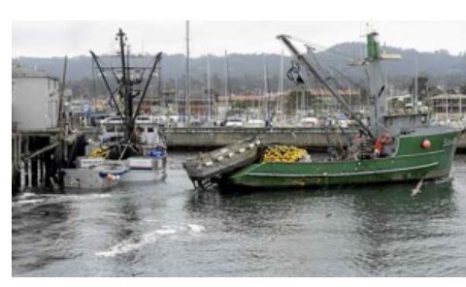
Monterey Bay fishermen working round the clock to pull in plentiful squid
In Monterey Harbor, a collection of at least eleven boats have been fishing for squid not far from shore since April 1, their lights visible off the coast at night. When the fishing is good, said Joe Russo, second captain and deckhand on the fishing vessel King Philip, it’s not uncommon for them to spend 24 hours a day netting tens of thousands of pounds of slippery squid with each return to shore. They continue through the spring, summer, and into early fall, if they don’t exceed the quota set by the California Department of Fish and Wildlife. >click to read<08:47
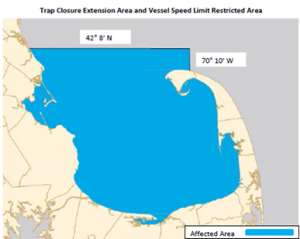
Mass. Division of Marine Fisheries has enacted two right whale emergency regulations
The Division of Marine Fisheries has enacted two emergency regulations to protect vulnerable aggregations of endangered northern right whales in Cape Cod Bay. These regulations, effective immediately, are designed to reduce the risk of collisions with vessels and entanglements. Extension of Trap Gear Closure The existing February 1 – April 30 Large Whale Trap Gear Closure is being extended through Sunday, May 6 for a portion of Cape Cod Bay. >click to read<22:34
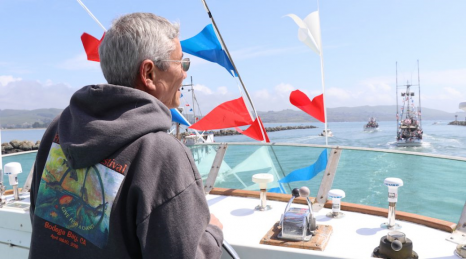
45th Annual blessing of the Bodega Bay fishing fleet marks a shorter and uncertain salmon season
The Karen Jeanne rocks and sways as Dick Ogg steers out of Bodega Harbor, past the rocky breakwall where surf-casting fishermen wave from their perches.Behind him, an array of boats fall into line, each decorated with signs and flags, their decks full of fishermen, families and friends. To some this route is a familiar morning commute, the first turn on a many-miles journey in pursuit of albacore tuna, salmon, Dungeness crab or sablefish, depending on the season. To commercial fishermen the harbor marks the safe haven after a dangerous journey. For others, today offers a rare boating adventure – a chance to picnic, take photos and crack open a beer before noon.>click to read<21:29
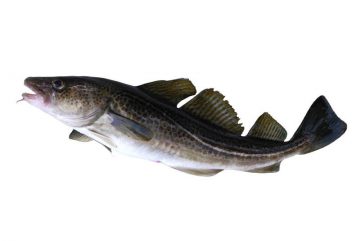
Fish or cut bait
Derek Butler of the Association of Seafood Producers says he was trying to make a point when he argued for an end to the recreational cod fishery. The point he was making is that the recreational fishery is by and large unregulated: there’s no clear picture about who is taking fish, where they are taking it and how much cod is actually landed. Shine a light by saying close the fishery, and get more eyes looking at the problem. His call for a ban may have generated plenty of heat, but we’ll take the bait. What Butler is raising is a question that bears closer analysis. >click to read<20:14
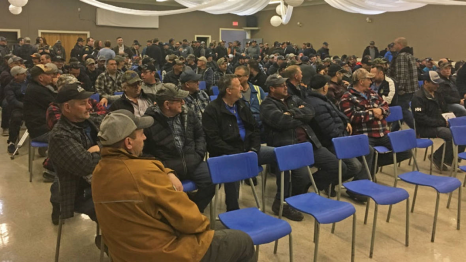
Fishermen’s union requests emergency meeting with minister over new lobster rules
The Maritime Fishermen’s Union has requested an emergency meeting with Fisheries and Oceans Minister Dominic LeBlanc before the lobster season starts next week to discuss new measures aimed at protecting North Atlantic right whales in the Gulf of St. Lawrence. The union doesn’t understand why the strict protective measures, which include closures and rope limits, have been sprung on lobster fishermen, said president Carl Allen.,,, LeBlanc walked past reporters Wednesday when asked about the issue.>click to read<17:44
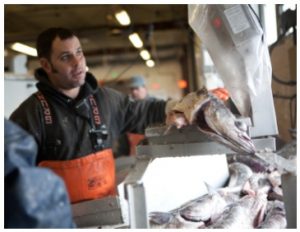
NEFMC Discusses Offshore Wind, Clam Dredge FW, Skates, Groundfish, Herring, IFM, and More at Mid-April Meeting
The New England Fishery Management Council met April 17-19 in Mystic, CT and discussed a wide range of issues that touched on everything from industry-funded monitoring to offshore wind, Clam Dredge Framework, Skate Wing Fishery, Northeast Multispecies -Groundfish, Atlantic Herring –River Herring/Shad, The New England Council paid tribute to two retiring Council members –Mark Alexander of Connecticut, left, who served on the Council for 10 years, and Mark Gibson of Rhode Island, >click to read<15:16
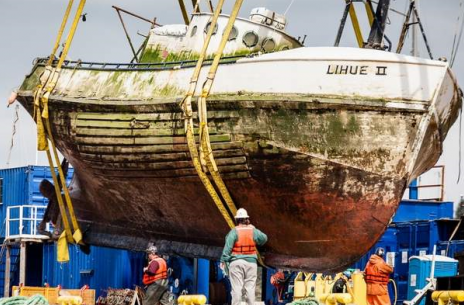
Raising Lihue II
The Lihue II was more or less an orphan. Its owner abandoned it at the port in mid-November 2017. On Nov. 18, it sank during a storm. Fast action by port employees, the Coast Guard and environmental agencies kept the boat from spilling much oil, but Port Manager Guy Glenn Jr. still had to figure out what to do with it. With help from the state Department of Natural Resources Derelict Vessel Program, Glenn gained legal custody of the boat, and arranged to have Global Diving and Salvage, a Seattle company that has done a lot of work for the state, remove it. (9 photos) >click to read<14:10
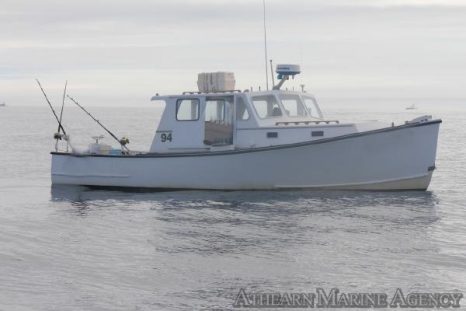
Athearn Marine Agency Boat of the Week: Cape & Island Boats Duffy 35′ Tuna/Charter, Cat 3208TA
Specifications, information and 12 photos >click here< To see all the boats in this series, >Click here<13:04
Plans to line the shore of Rhode Island with wind turbines threaten fishermen livelihoods
When Greg Mataronas steams out of Narragansett Bay as early as 3 a.m., he is headed for grounds he knew as an eight-year-old.,, there is a new force threatening Mataronas’ ability to provide for his wife and children: offshore wind energy.,,, “All of our concerns fall on deaf ears,” Lapp said. “I personally have been meeting with BOEM for three years.” Lapp added that she gave “confidential business information” from over 20 fishing vessels to BOEM to demonstrate that there was heavy fishing activity on one particular lease site, but she said BOEM issued the lease regardless. >click to read<10:29
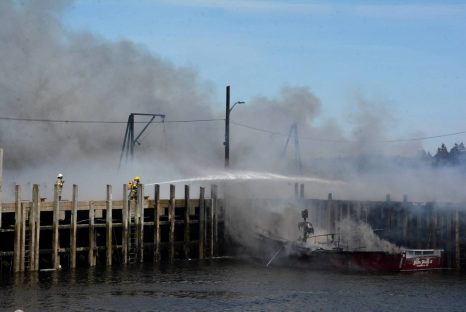
Firefighters fight lobster vessel fire; wharf also damaged in blaze
A lobster fishing vessel at the wharf on the Town Point Wharf in Rockville, Yarmouth County, was destroyed by fire the afternoon of April 24. Firefighters from several departments fought the blaze that comes just over a month before the end of commercial lobster season. Other fishermen at the wharf – after moving their boats out of harm’s way away from the flames – then did what they could to help douse the fire on the boat and the wharf by circling around using hoses on their vessels. >click to read<09:29
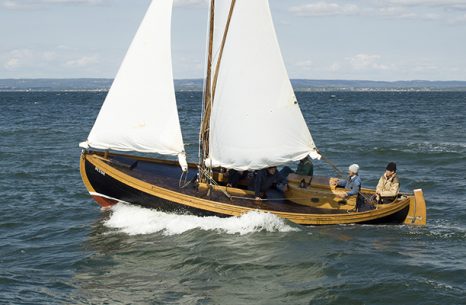
Sweden’s oldest fishing boat restored
Bessie was built in 1909 just outside Malmö for a herring fisherman, Anders Matsson, with the registration code MÖ 347 (today it is HG 52). Her restoration is the largest project to date from the Ravanis’ yard and the finished boat has been turning heads wherever she sails. “If you remain faithful to the original lines and construction, show respect for the skilled workers who built her and use timber of the same high quality as was used then, then it is very much the same boat,” said Martin. All that is left of the original Bessie is nine planks and two small frames in the bow. >click to read<20:41

AFT Holdings to Withdraw from Direct Investment in Tuna Vessels
AFT Holdings, Inc. today announced its intent this year to withdraw its direct investment in the U.S. Flagged Ocean Global and Sea Global Fleet of Tuna Seiners. Going forward, the international investment group will focus its resources on its current portfolio of companies, as well as in creating new opportunities in the functional and healthy food space. In 2007, AFT and its principals were one of the original investors to commit to the resurgence of the U.S. Tuna Fleet in the Western Central Pacific. In 2006, the U.S. Fleet had been reduced to 13 vessels,,, >click here to read<19:27
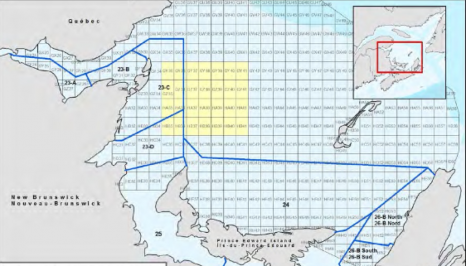
New rules sprung on lobster fishermen to protect whales
Parts of the water off the coast of New Brunswick will be closed to lobster fishing this season to protect the North Atlantic right whale, the Department of Fisheries and Oceans has told lobster fishermen.,, But Tuesday’s notice reveals many of the same measures announced in late March for the crab fishery will be applied to lobster fishing in the gulf as well. Lobster fishermen reacted with surprise and disappointment and suggested the new rules were mostly about the federal department’s public image. >click to read<17:48
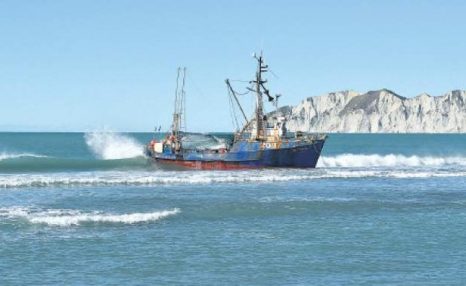
Trawler Jay Patricia aground near Waiapaoa
A fishing vessel went aground on a sandbar on the city side of the Waipaoa River mouth during the night. A refloating attempt for the steel-hulled long-liner Jay Patricia was hoped to be made around high tide in the middle of the day, or otherwise on high tide tomorrow. Eastland Port general manager Andrew Gaddum said the trawler remained upright on the sandbar. “The grounding happened at about 2am today as the vessel was returning to Gisborne from a fishing trip.” >click to read<17:20
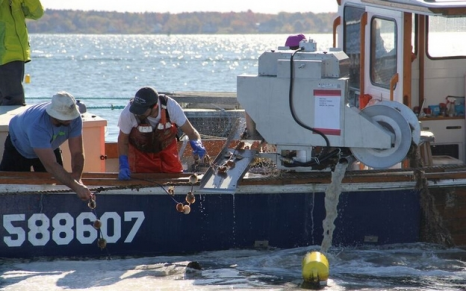
Maine: Promising scallop aquaculture initiative gets $600K boost
The Foundation for Food and Agricultural Research awarded a $300,000 grant to CEI to investigate the economic viability of a Japanese scallop production technique that has been shown to grow scallops faster as well as produce larger yields of meat. U.S. Rep. Chellie Pingree, D-1st District, announced Monday that FFAR, a nonprofit corporation established by the 2014 Farm Bill, awarded the $300,000 research grant to Hugh Cowperthwait of CEI, which is matching the award to double its impact. >click to read<13:10
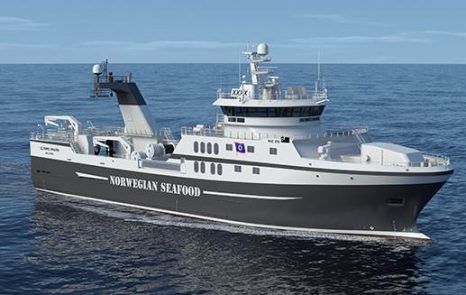
Rolls-Royce to Design, Equip New Fishing Vessel
Rolls-Royce said it has signed a contract to deliver ship design and a range of equipment to a 70-meter long stern trawler to be built for Olympic Seafood based in Fosnavåg, Norway. The fishing vessel is to be built by Cemre shipyard in Turkey, who also holds a contracted option for a second vessel of the same type for Olympic Seafood. The vessel is designed for bottom trawling as well as pelagic trawling and will have a modern factory deck arrangement to handle and freeze both white fish and shrimp and ensure a high quality catch. >click to read<12:20
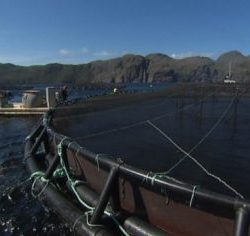
Audit finds Canada’s federal government fumbling on fish farms
The federal government is fumbling the management of fish farms, while failing to enforce rules and manage risks of infectious diseases, parasites, drugs and pesticides that cause damage to wild fish, says a scathing audit released on Tuesday. The audit was one of three reports tabled on Tuesday in the House of Commons by Julie Gelfand, Canada’s commissioner of the environment and sustainable development. It sounds alarms about Canada’s fish farms on Canada’s coasts while questioning the effectiveness of about $30 million in annual government spending to oversee the $1-billion industry. >click to read<11:47
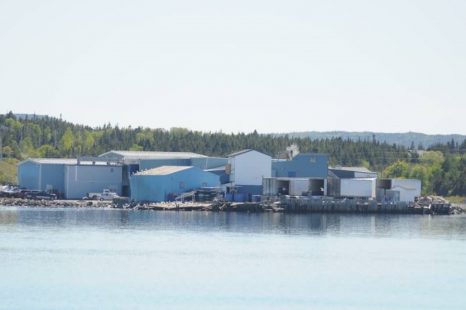
New Harbour dealt a blow as Daley Brothers decide not to open fish plant for 2018
The Trinity South community of New Harbour is facing an unheard-of predicament, as Daley Brothers has decided not to open the local fish plant for the 2018 harvesting season. News of the company’s intentions began to trickle through the community over the weekend after employees began receiving notices from Daley Brothers informing them of the company’s decision. Reached by The Compass Monday afternoon, provincial Fisheries Minister Gerry Byrne said he first heard from concerned workers on Saturday, April 21. >click to read<09:27
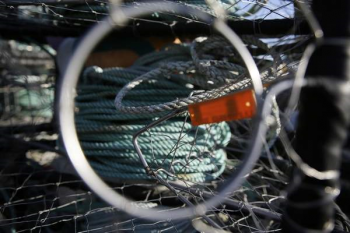
Oregon Fish and Wildlife Commission adopts new rules for Dungeness crab
Harmful algal blooms complicated commercial Dungeness crab seasons on the Oregon Coast for the past three seasons, threatening the viability of the state’s most valuable fishery.,,The new rules outline evisceration protocols that go into place when levels of the naturally occurring marine toxin domoic acid spike. The toxin can accumulate at high levels in a crab’s guts, but remove the guts and the meat is still safe to eat. The rules also establish 12 distinct crabbing zones on the Oregon Coast, narrowing the areas that can be closed or opened at any given time. >click to read<22:42






